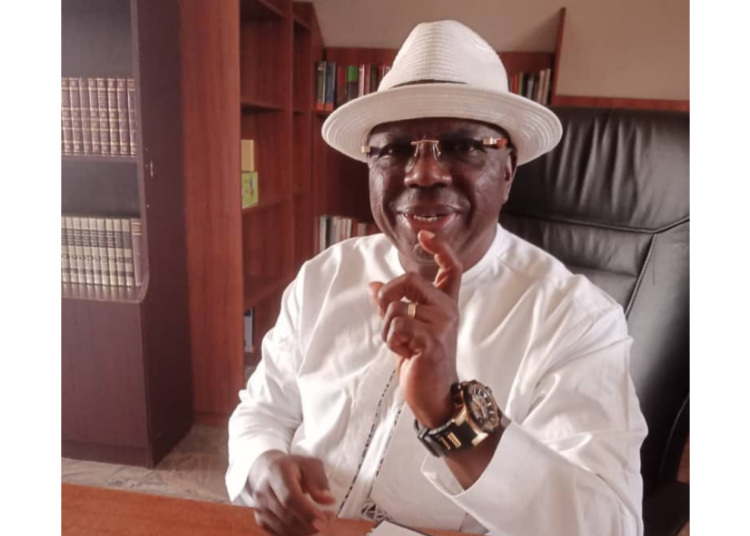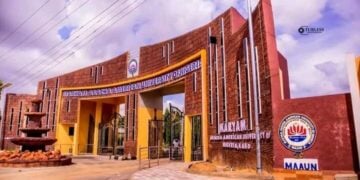In his now oft-quoted aphorism, William Barclay, the Scottish author, church minister, and Professor of Divinity and Biblical Criticism at the University of Glasgow once says, “There are two great days in a person’s life—the day we are born and the day we discover why.” Barclay’s assertion appears to define the birth, life, and career of our birthday celebrant, the Distinguished Professor Iyorwuese Hagher, who is best known as an erudite scholar, shrewd politician, consummate diplomat, prolific writer, modern poet, and accomplished playwright. Hagher’s seventy-fourth birthday is, indeed, a success story of a man who comes from a humble background, discovers at a very young age the value of education, and does everything possible to give his life purpose and direction in all his endeavors serving humanity.
A former Nigerian senator, two-time minister, and a high commissioner to Canada, after his duty tour as ambassador to Mexico with concurrent accreditation to Panama, Costa Rica, and Guatemala. Professor Hagher received his early primary school education at Zaki-Biam and attended WM Bristow Secondary School Gboko, Benue State, Nigeria, He attended Kuru Government Secondary School, near Jos where in 1970, he took the Cambridge University Matriculation exam that gave him direct entry at the Ahmadu Bello University, Zaria. At ABU, he obtained a Bachelor of Arts honors degree in the English Language in 1974, a Master’s degree in Drama, and Doctor of Philosophy degrees (1977 and 1981 respectively). He taught Drama and conducted research on African indigenous cultures at the Ahmadu Bello University, Zaria, and the University of Jos. Through a career of hard work and profound erudition, Hagher rose to become a Professor of Theatre and Drama for Development in 1990. All these academic attainment and experience in research, teaching, university management, and administration had set the stage for his forays into national politics, global leadership, and a life of community service.
Hagher has an admirable career as a playwright. His long list of plays, among others, include, Aishatu— an advocacy play against the use of drugs by teen commissioned by the Lion’s Club of Jos, written in 1985, and performed on 14th August 1985 as directed by Saint Gbilekaa; Mulkin Mata—written and directed by Hagher and was premiered on 14th October 1986; Anti People—written and directed by Hagher on 26th February 1987 at the Open Air Theatre, University of Jos; We Protest—written by Hagher and directed by Musa Dauda on 2nd March 1988; Camps of Segbwema—inspired by Fuente Ovejuna and Lope De Vega, written in 1989 by Hagher and premiered at the University of Jos on 18th November 1989; Comrade and Voltage—written by Hagher in 1996 and was directed at the premiere at the University of Lagos by Dr. Hope Eghagha; The Lamp of Peace—written by Hagher, directed by Mrs. Bose Tsevende and premiered at the Open Air Theatre of the University of Jos, Nigeria on 15th March 1998; The Trial of James Skott—written by Hagher in 1999. It was produced at Vere Street, West End London, and directed by Zara Jeffreys. His other plays include Lifetimes—written by Hagher, from workshops of the Theatre for Development on HIV-AIDS, sponsored by UNICEF in 1998 at Iseyin Oyo State Nigeria; The Story and Play—written by Hagher and directed by Dapo Adelugba and Femi Osofisan; The Professor and the Cathedral—written by Hagher in 2001 and premiered at the University of Abuja Open Air Theatre as directed by Dr. Emmanuel Sani Dandaura; The Masquerade and the Elephant—written by Hagher in 2002 and premiered at the Ahmadu Bello University Zaria between 22 – 24 May 2002 as directed by Dr. Samuel Ayedime Kafewo; Global Home—written in 2005 by Hagher, and premiered at the Leadership Theatre in Jos, Nigeria on 29th November 2006 as directed by Mrs. Bose Tsevende; 2008 Global Home and other plays—written by Hagher and published by Spectrum Books Ibadan’ and some other collected Plays which can be accessed on the web, among others. Yet, his critical works, such as Leadership and Governance in Nigeria (2001), Leading Africa out of Chaos (2002), Beyond Hate and Violence (2003), and Weapons of Mass Instruction (2004), are prized globally for their incisive analysis of Nigeria’s national question. His book The Coming Revolution in Nigeria was published the year Hagher was a presidential aspirant in the SDP in 1999. There is not a single copy left in the market and it is being revised for the second edition at the moment. A Day in Mexico (2009) is a collection of Hagher’s poetry establishing Hagher as a pan-Africanist, and defender of Africa as a public intellectual.
Hagher has worked across the genres successfully. In 2020, Hagher, then 71 years old wrote his first novel, The Conquest of Azenga (2020) which won an ANA award, and global critical acclaim as the first novelist anywhere to have successfully countered Western racism in literature by psycho-analyzing Western society and the evil called colonialism. His writings deeply disturb the status quo and his heroes are the common people which Hagher has pitched camp against the mendacity and oppression of the elite, the new slave masters. It is to Hagher ’s credit that despite his robust erudition, his fierce penmanship, and his multidimensionality of talent, he exudes extraordinary humility and puts Nigeria, others, and his family ahead of himself. Hagher is well known among his friends and colleagues for legendary generosity. He gives and gives his substance and exudes a boyish charm and charisma, and walks with a bounce and glee in his eyes, despite advancing age. His close friends and mentees refer to him playfully as the Rabbi of the Hagher School of Leadership, which teaches; service, love, sacrifice, and duty.
They pay avid respect to Hagher’s depth of knowledge and pedagogy about the issues of leadership, follower-ship, corruption, hate, governance, tribalism, terrorism, and cultural domination, among others, plaguing Nigeria, Africa, and the rest of the world.
Hagher has been also active as a politician for 40 years. He was elected to the Nigerian Senate in 1983, where he served as the Deputy Chief Whip and Secretary of the Senate Caucus. He was again elected as a member of the constitutional conference of 1994-1995. Hagher bemoans the non-adaptation of the Constitution which claims was the best Constitution that paid attention to the Nigerian diversity.
Politics may be a dirty game, but Hagher has raised the bar of politics without bitterness. He is not known for political controversies nor the cut-throat struggle that seems to define the politics of many Nigerian politicians. He fights for inclusion for women and the youth. He shares bonds of friendship with those outside his political parties and does not allow party differences to separate him from his friends. Hagher is distraught when some of his political friends are consumed by unenlightened self-interests, and wallow in pathetic conspicuous accumulation and consumption when the land is filled with hungry mouths to feed, thinly clad urchins to be sent to schools and clothed, and many unable to sleep with both eyes closed due to banditry.
In 2003, for instance, he was awarded the National Honour, as Officer of the Order of the Niger, OON.
Indeed, Hagher is a global citizen who has served his people, country, and the global community well. At 74, Hagher looks like a man whose age meter is set anti-clockwise: the more the years go by, the younger and fresher he looks. The secret is simple: Hagher is a deeply spiritual person attached to his wife Nancy for 49 years. He has no enemies and knows how to abase and abound in simplicity. Hagher savors only African food, with Benue river fish, vegetables, fruits, and fiber. He is a poster child humanist with hordes of children, and grandchildren. ( foster and biological) His home is open to all, and no one comes to his home without eating or going back without an envelope or handshake. As he marks his birthday today, we join his family, former students, friends, and political colleagues to wish him the age of Methuselah!
– Oryila, teaches at the Department of English, Benue State University, Makurdi.




